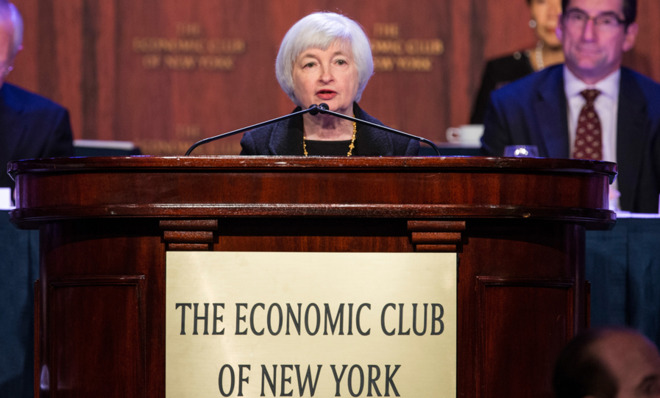Janet Yellen's 3 questions for the economy
The Fed's first female chief will focus on these questions as she mulls unwinding the central bank's quantitative easing program

A free daily email with the biggest news stories of the day – and the best features from TheWeek.com
You are now subscribed
Your newsletter sign-up was successful
Today, Federal Reserve Chair Janet Yellen delivered a speech on the economy and monetary policy at the Economic Club of New York, offering attendees a chance to quiz the first female Fed chair on the state of the economy and what the central bank will do next.
In late March, Yellen said the Fed could begin to raise interest rates within six months of ending its quantitative easing program, which has seen the Fed buy billions of dollars worth of bonds and other assets to lower lending costs. However, today Yellen erased any concerns of a specific timetable for raising interest rates, saying policy would be solely determined by progress on employment and inflation.
Yellen laid out the three questions that Fed policy-makers will consider as they decide when to unwind the central bank's emergency programs:
The Week
Escape your echo chamber. Get the facts behind the news, plus analysis from multiple perspectives.

Sign up for The Week's Free Newsletters
From our morning news briefing to a weekly Good News Newsletter, get the best of The Week delivered directly to your inbox.
From our morning news briefing to a weekly Good News Newsletter, get the best of The Week delivered directly to your inbox.
1. Is there still significant slack in the labor market?
Yellen said she still thinks there is a lot of spare capacity, or slack, in the labor market. (Others disagree.) She cited three pieces of evidence for this view: the headline unemployment rate, which at 6.7 percent is around 1 percentage point above the Fed’s definition of full employment; the roughly seven million Americans with part-time jobs who would prefer full-time work; and the large numbers of long-term unemployed.
That Yellen sees significant slack in the labor market indicates that the Fed will continue fighting unemployment — which is in line with what Yellen has suggested in the past.
2. Is inflation moving toward 2 percent?
A free daily email with the biggest news stories of the day – and the best features from TheWeek.com
The other half of the Fed’s mandate requires a 2 percent annual rate of inflation, and inflation is running at around 1 percent a year. Yellen said, "We anticipate that, as labor market slack diminishes, it will exert less of a drag on inflation." In other words, as the economy returns closer to full employment, we should expect to see a bump in inflation. When that bump looks set to arrive, the Fed will begin hiking interest rates. Yellen pointed to wages — which have risen just 0.6 percent in the past year — as a key metric to judge whether inflation is really picking up.
3. What factors may push the recovery off track?
The real world is a little more complicated than the theoretical world of economics. Unexpected events can derail the best-laid plans. That means that central banks, in pursuing price stability and low unemployment, should be flexible enough to adjust to new events. And that’s why the Fed cannot adopt an explicit timetable for its policy.
If there’s a financial crash in China next month, causing inflation to plummet and unemployment to spike, then the Fed will have to be prepared to adopt a looser policy. Likewise, if there’s an unexpected economic shock that is positive, causing unemployment to fall dramatically below 6 percent and inflation to jump over 2 percent, then the Fed will have to raise rates quickly to prevent inflation getting out of hand.
This is probably the hardest question to answer, because it’s impossible for the Fed to react to events before they happen. So by emphasizing these questions, what Yellen is really emphasizing is flexibility. The Fed’s mandate is low inflation and low unemployment, not raising interest rates by a certain date.
John Aziz is the economics and business correspondent at TheWeek.com. He is also an associate editor at Pieria.co.uk. Previously his work has appeared on Business Insider, Zero Hedge, and Noahpinion.
-
 How the FCC’s ‘equal time’ rule works
How the FCC’s ‘equal time’ rule worksIn the Spotlight The law is at the heart of the Colbert-CBS conflict
-
 What is the endgame in the DHS shutdown?
What is the endgame in the DHS shutdown?Today’s Big Question Democrats want to rein in ICE’s immigration crackdown
-
 ‘Poor time management isn’t just an inconvenience’
‘Poor time management isn’t just an inconvenience’Instant Opinion Opinion, comment and editorials of the day